The fusion of AI and game development is revolutionizing how teams build, test, and iterate game environments. The Unreal Engine MCP Server is at the forefront of this transformation, empowering developers to control Unreal Engine with simple, natural language commands. Imagine creating and editing 3D scenes, assets, and environments just by typing requests—drastically accelerating workflows and freeing up time for creative problem-solving.
If you’re an API developer or technical lead looking to boost your AI coding workflows, consider how integrating your AI-powered IDE with Apidog can unlock even more efficiency. The Apidog MCP Server lets your AI assistant access up-to-date API specs, generate or edit code based on live documentation, and create data models or DTOs that fit your API design—all while keeping thorough, relevant documentation at your fingertips.
Apidog seamlessly connects your API projects to tools like Cursor, so your AI coding assistant works with the latest API changes—complementing features like Memory Bank with structured, actionable API data for faster, smarter development. Explore the official documentation or the NPM page to learn more about the Apidog MCP Server. For teams seeking an integrated, developer-focused alternative to Postman, Apidog stands out as a robust, cost-effective solution.
This tutorial walks you through setting up and using the Unreal Engine MCP Server, showing how AI can fundamentally transform your game development process.
What Is Unreal Engine MCP Server?
Natural Language Control for Unreal Engine
The Model Context Protocol (MCP) acts as a bridge between Unreal Engine and AI systems, translating plain English commands into actionable Unreal Engine API calls. Think of it as:
Your Command → MCP → Unreal Engine API → Automated Results
With Unreal Engine MCP, you can:
- Automate repetitive tasks
- Generate and populate scenes with assets
- Rapidly prototype gameplay ideas
- Streamline asset management
Studios adopting MCP have seen iteration cycles cut by over 60%, making it a game-changer for efficiency.

Core Components of the Unreal Engine MCP Ecosystem
- MCP Core Plugin (UnrealMCP): Enables MCP communication within Unreal Engine.
- Python Scripting Plugin: Lets MCP execute Python scripts to control engine features.
- AI Clients (e.g., Claude): Interprets your natural language instructions and generates the right actions.
- MCP Server: Mediates between the AI client and Unreal Engine, running commands as Python scripts in your project.
Step-by-Step: Setting Up the Unreal Engine MCP Server
1. Install the Unreal Engine MCP Ecosystem
A. Clone the Core Plugins:
git clone https://github.com/chongdashu/unreal-mcp
git clone https://github.com/kvick-games/UnrealMCP
B. Install Python Dependencies:
pip install unreal-mcp fastmcp aiortc
Ensure Python and pip are properly set up. Unreal Engine’s Python development tools (available via the Epic Games Launcher) may also be required.
C. Enable Plugins in Unreal:
- Open your project
- Go to Edit → Plugins
- Enable “Python Editor Script Plugin” and “UnrealMCP”
- Restart Unreal Engine when prompted
If “UnrealMCP” isn’t visible:
- In Content Browser, select Add/Import → Add Feature or Content Pack
- Click All, then choose UnrealMCP
2. Connect AI Clients (e.g., Claude Desktop) to Unreal MCP
A. Locate Claude Configuration:
- Open
%APPDATA%\Claude\claude_desktop_config.jsonin Windows Explorer
B. Add MCP Server Entry:
{
"mcpServers": {
"unreal": {
"command": "C:\\YourProject\\Plugins\\UnrealMCP\\MCP\\run_unreal_mcp.bat",
"args": []
}
}
}
Note: Replace the path with your actual run_unreal_mcp.bat location, using double backslashes (\\). This file is inside your project’s Plugins\UnrealMCP\MCP\ directory.
3. Verify the Connection
- Open your Unreal Engine project
- Go to Window → Developer Tools → Output Log
- Filter by “LogMCP”
You should see messages like:
[2025-03-31 12:51:00] MCP: Server running on port 55557
[2025-03-31 12:51:05] MCP: Claude Desktop connected
Success! Your MCP Server is ready.
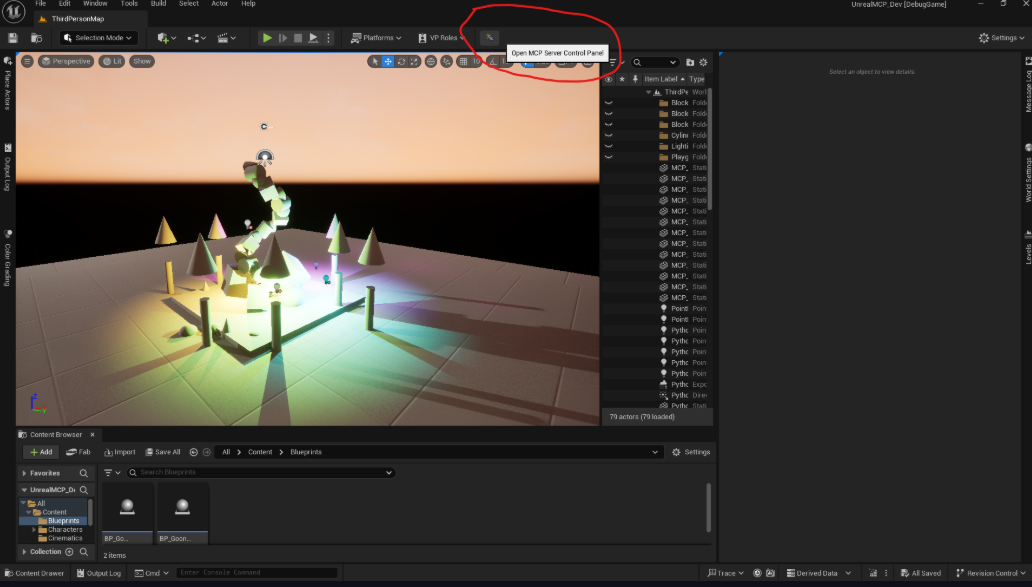
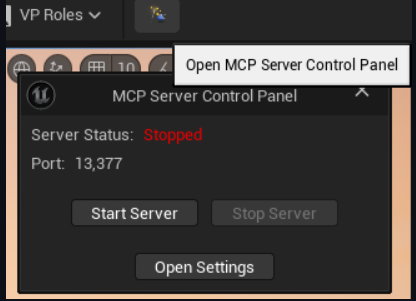
For more MCP server options, check out HiMCP.ai – Discover 1682+ MCP Servers.
Real-World Applications: How Unreal Engine MCP Accelerates Game Development
AI-Assisted Level Design
Example: Instantly Build a Medieval Village
-
Command:
"Create medieval village with 15 buildings, cobblestone paths, and torch lighting" -
How It Works:
- AI generates a scene plan and concept art
- MCP translates the request into Unreal Python:
# Batch spawn buildings for i in range(15): building = spawn_actor( class_name="BP_MedievalHouse", location=(i*500, 0, 0) ) building.set_material("/Game/Materials/Stone_Wall") - Navigation meshes and lighting are generated automatically
Example: Flappy Bird Clone in Minutes
- Command:
Let's build a flappy bird clone to showcase the unreal mcp server! Let's do things step by step! - The AI assistant plans and implements the game logic interactively.
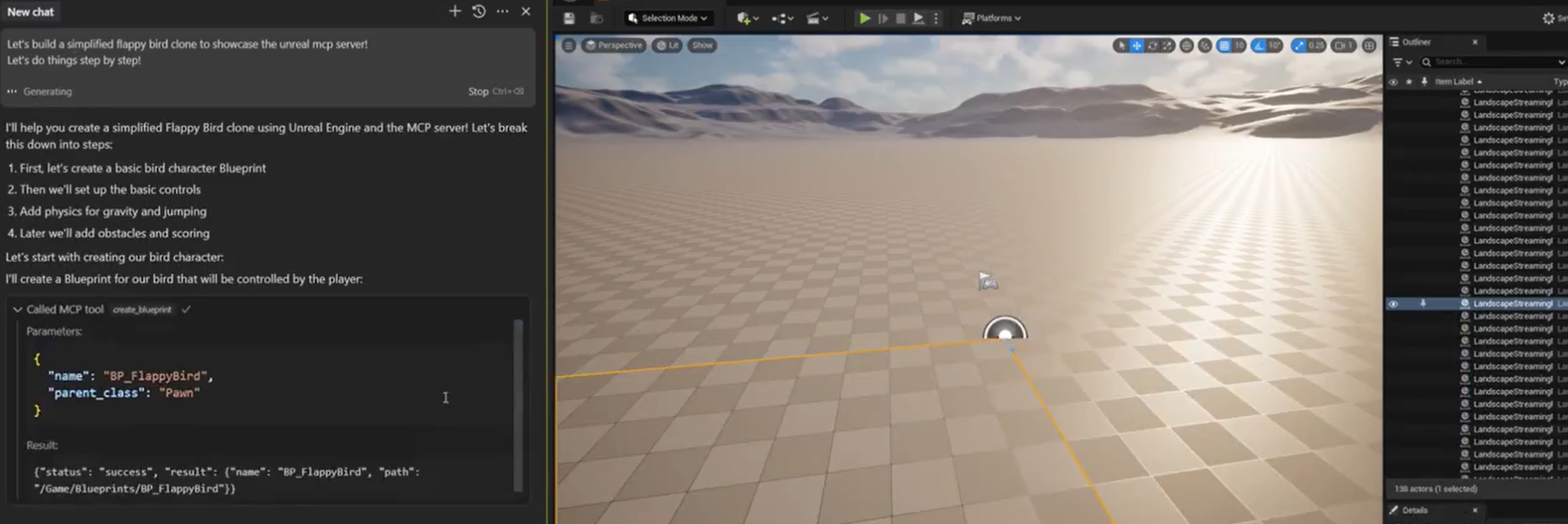
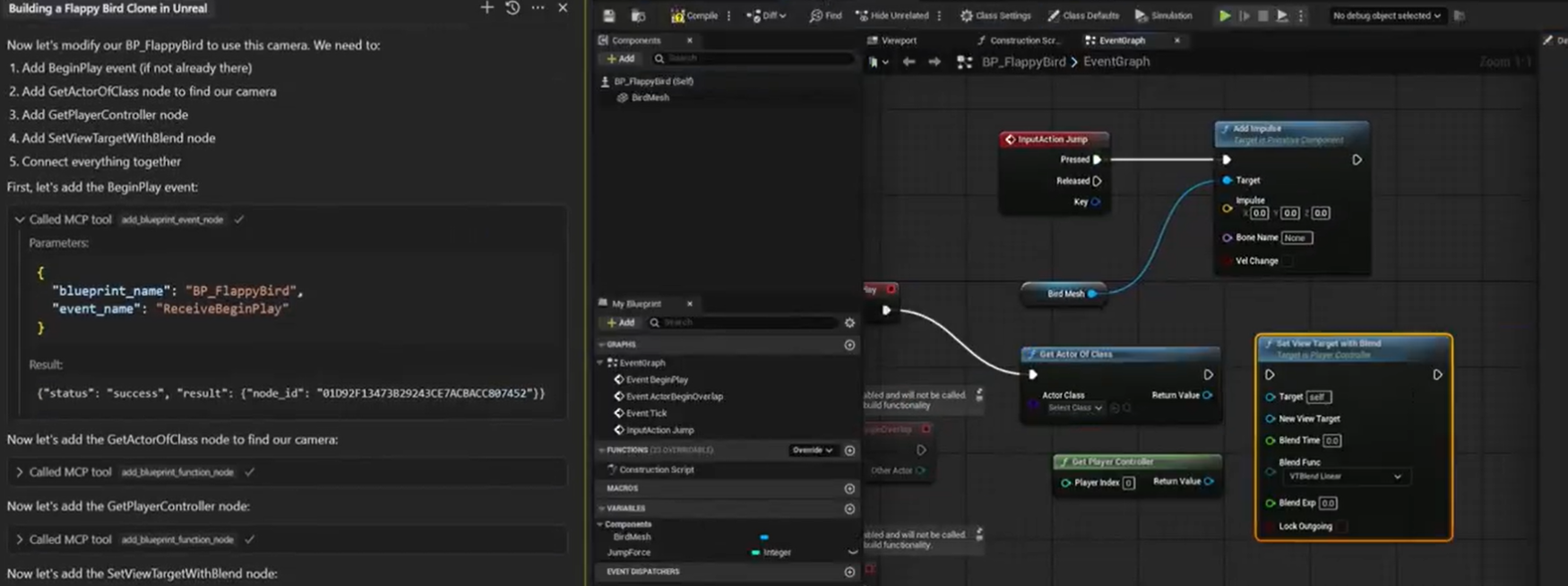
The result: a functional Flappy Bird-style game, ready for further iteration or refinement.
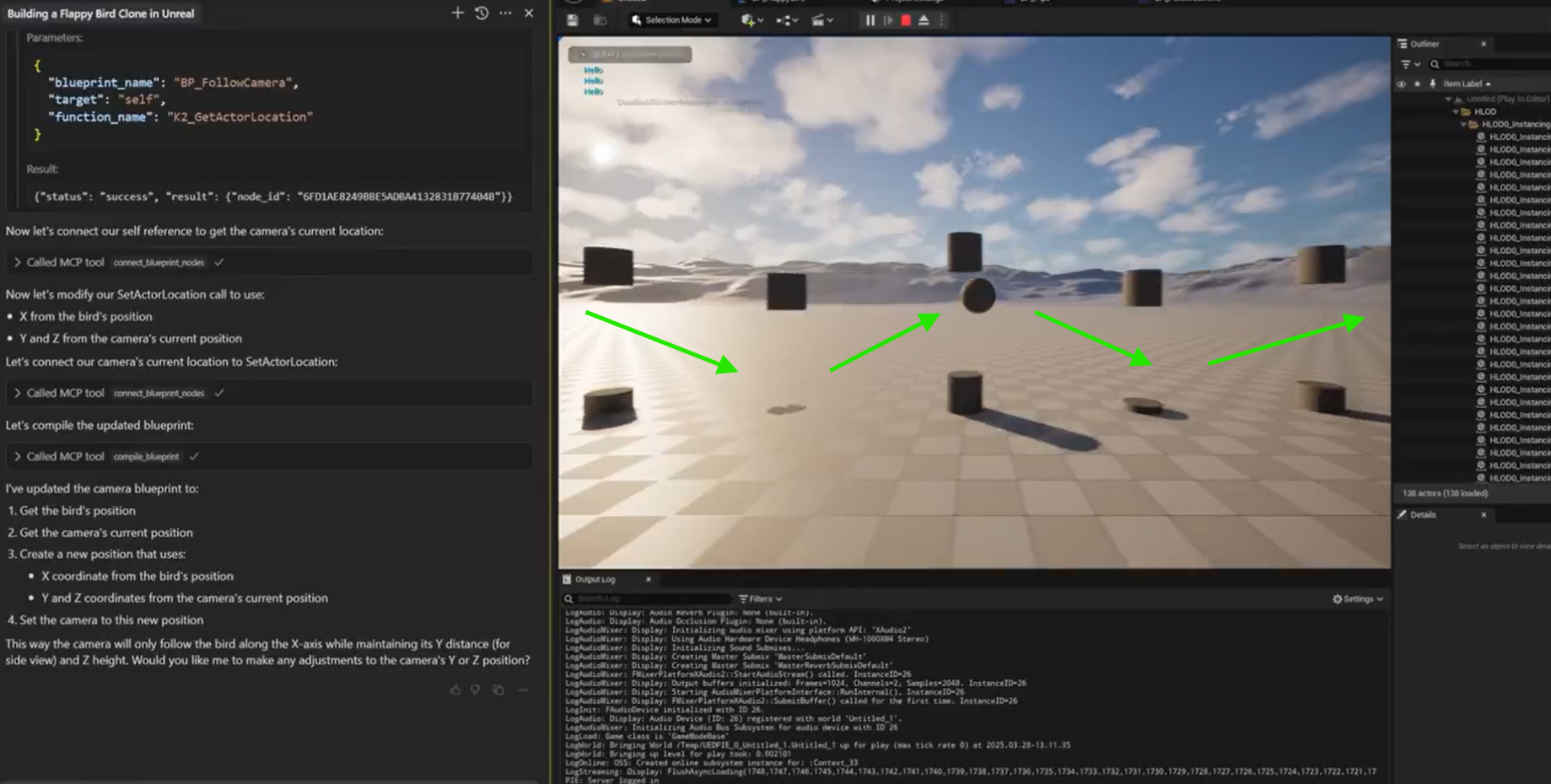
AI-Driven Debugging via Chat
Troubleshooting is faster with MCP.
Scenario:
"Why is my character falling through the floor?"
MCP Workflow:
- Checks collision settings and physics
- Returns actionable feedback:
[FIX] Set collision preset to 'Pawn' on BP_Character[WARNING] Missing capsule component in Blueprint
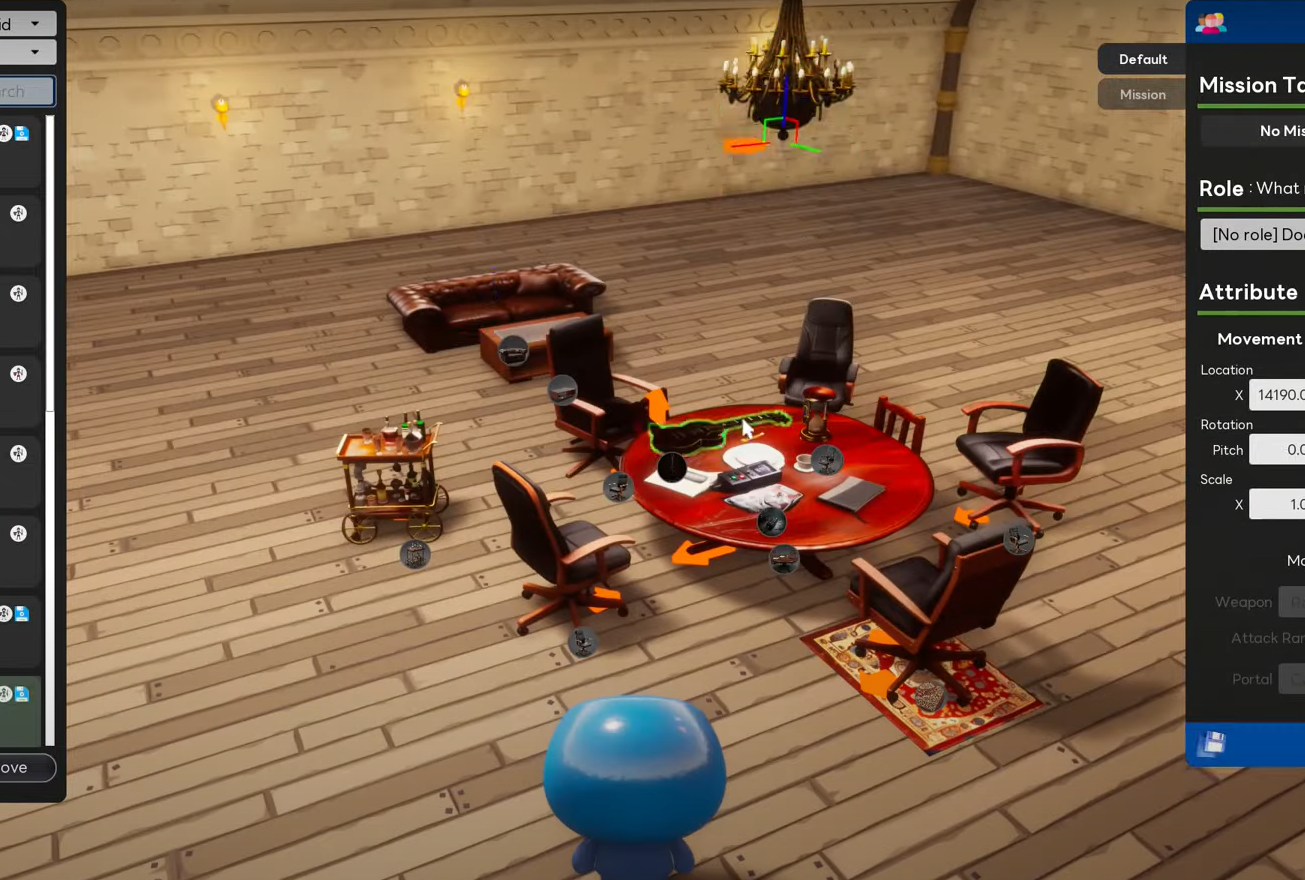
Advanced Techniques: Customization & Multi-Agent Collaboration
Custom MCP Tools
Automate repetitive or complex tasks by registering custom tools.
Example: Spawning Enemies
from unreal_mcp import register_tool
import unreal
@register_tool("SpawnEnemies")
def spawn_enemies(count=5, type="Zombie"):
for _ in range(count):
enemy = unreal.EditorLevelLibrary.spawn_actor_from_class(
unreal.load_class(None, "/Game/Enemies/BP_" + type),
unreal.Vector(0,0,100)
)
if enemy:
if hasattr(enemy, 'set_ai_behavior'):
enemy.set_ai_behavior("Aggressive")
else:
unreal.log_warning("set_ai_behavior is not defined for this enemy class.")
else:
unreal.log_error("Failed to spawn enemy of type: " + type)
Usage:
"Spawn 3 flying dragons near player"
Multi-Agent Workflows
Coordinate teams of AI agents for different roles:
designer:
model: claude-3.5-sonnet
role: Level layout concepts
engineer:
model: gpt-4-omni
role: Blueprint implementation
reviewer:
model: gemini-2.0
role: Performance checks
This approach mirrors real-world development teams, letting AI agents focus on their strengths.
Security and Best Practices for MCP Server
1. Permission Layers:
Enable approval workflows via Edit → Project Settings → MCP → Enable Approval Workflow to safeguard sensitive actions.
2. Version Control:
Add these lines to your .gitignore to prevent accidental commits of generated content:
/MCP_Output/
/AI_Generations/
3. Resource Limits:
Set safe limits in your configuration files to avoid runaway processes:
[MCP_Settings]
max_spawn_per_minute=50
memory_limit=8GB
Embrace Conversational Game Development
Unreal Engine MCP represents a shift from manual scripting to conversational, AI-assisted development. Whether you’re rapidly designing new levels or debugging complex interactions, this tool enables you to focus on design and innovation—not repetitive coding.
Ready to try it yourself? Open your AI assistant and enter:
"Build me a spaceship interior with flickering lights and alien vegetation"
With seamless integration to Apidog, your API workflows can keep pace with this new era of intelligent, conversational game development.




